It wasn’t all that long ago when San Jose Sharks and St. Louis Blues met in the Western Conference Final. They’ll met again this season and it is a different Sharks team, even if most names are familiar.
For those Blues fans who want to learn about the Sharks, The Hockey Writers is here to help. We’ll go over the roster, give you a feel for the team and players, and cover some of the special situations.
Getting to the Western Conference Final
The Sharks have reached this point with a pair of seven-game series wins. The opening round series against the Vegas Golden Knights was physically brutal, mind-bogglingly intense, and highly emotional. Few series will ever match that one.
The second-round series against the Colorado Avalanche was closely contested, though the speedy Avs played a less physical game. One could make a case the Sharks were not the better team in either series. The Sharks are a resilient bunch and that has been a part of their series wins.
Under fourth-year head coach Peter DeBoer, the Sharks became an offensively-oriented team for the first time in his tenure. Still, how tight they play defensively has a lot to do with whether they win or not. The team finished the regular season 32-0-0 when giving up two or fewer goals. The pattern has held up, they are 7-0 in the playoffs when surrendering two or fewer tallies.
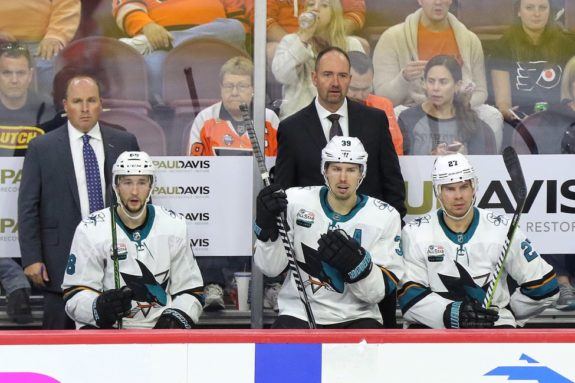
Sharks’ Driving Forces
The Sharks are driven by power forwards, a pair of elite offensive defensemen, one defensive star and two exceptional leaders.
When healthy, the Sharks are a deep team, giving them a chance to win with secondary players who’d be more prominent on lesser teams. Nine players tallied over 50 points this season, 12 tallied double-digit goals, four of those netted 30 or more scores. All are expected to play in the series opener.
The Sharks have played 14 games in the playoffs, so it isn’t shocking they hold many spots on the playoff leaderboard. Through two series, Sharks players lead in goals (9), assists (12) and points (14). Among players still in the tournament, four of the top five point-getters are Sharks and five of the 11 to register double-digit points are Sharks. The depth is evident.
The Sharks’ Battle Attrition
The playoffs are often referred to as a battle of attrition and the Sharks are going the other way.
The team looked like a MASH unit at times in the playoffs. But they are getting healthier. Joe Pavelski, Erik Karlsson, Logan Couture, Marc-Edouard Vlasic and Joonas Donskoi are among the key players whose health has improved recently.
Pavelski lost teeth in the playoff opener, then was concussed in Game 7 against Vegas. Karlsson has been dealing with a groin injury and missed almost the entire second half of the season. Donskoi took a massive hit in Game 6 against Vegas and didn’t return until Game 5 against Colorado.
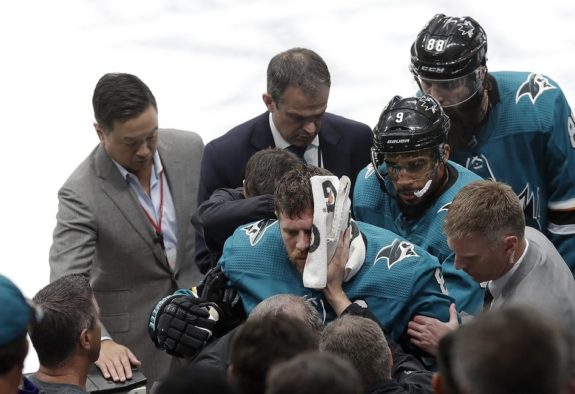
Earlier in the playoffs, Logan Couture lost teeth and more painfully, nearly lost a testicle blocking a shot (his description). Marc-Edouard Vlasic took a puck up high in the second game of the Vegas series and missed the rest of the game the next two. Pugilist Micheal Haley blocked a shot with his ankle in Game 3 of the first round series but played in the second round.
Earlier in the season, Sharks defenseman Radim Simek tore up his knee and he won’t be part of this series. He is the lone Sharks starter who is not healthy enough to play this series.
The Sharks’ Keys
In an earlier piece, I covered what the Sharks need to do to win games and the four keys I identified remain on point. Offensively, go behind the net. Get good goaltending from Martin Jones. Limit opponents quick-strike scores, with extra vigilance to avoid allowing odd-man rushes. And leverage a potentially lethal the power play by drawing penalties and scoring on the opportunities.
Two players to watch carefully are Erik Karlsson and Tomas Hertl. Karlsson can create all kinds of offense from his defensive position. In the playoffs, he’s put up 12 assists, but he’s also been on the ice for a ton of goals against and is minus-five. Power forward Hertl is the Sharks player other teams have most struggled to handle. He was the top player in the opening round. His two-goal effort was key to the Game 5 win against the Avalanche and he scored again in Game 7.
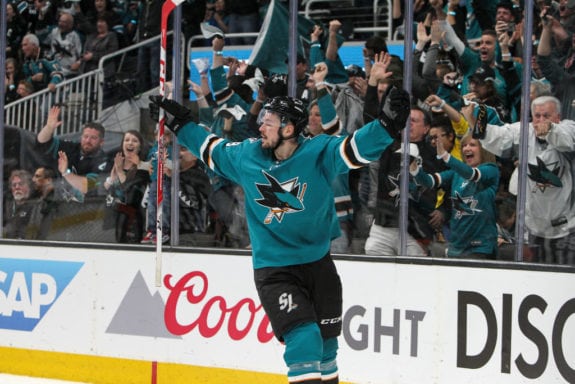
San Jose Sharks’ Goaltending
The Sharks are backstopped by goalie Martin Jones (jersey number 31). Barring injury, you can expect to see Jones play every minute of every tight game. It was a down regular season for Jones. His save percentage (SV%) for the season was .896, by far a career worst. Early in the season, he struggled behind a porous Sharks defense which allowed numerous odd-man rushes. Both Jones and the defense were problems. Though the Sharks tightened things up a good bit, Jones remained inconsistent.
In the series against Vegas, Jones resembled both Dr. Jekyll and Mr. Hyde. He was pulled in two games before the second period and gave up six goals in a third game. But beginning with Game 5 of that series, he’s been good – playing his best hockey of the season. He saved 58 of 59 shots and stole Game 6 in the series against Vegas. He was the team’s best player against the Avalanche.
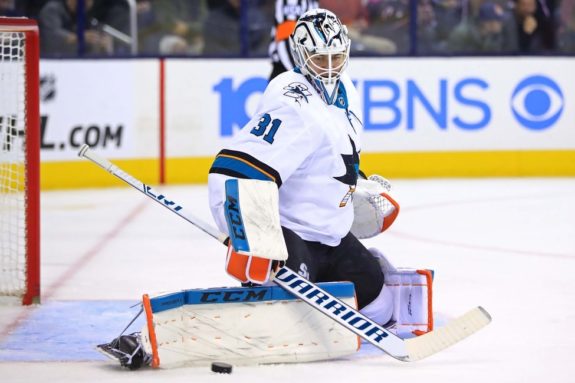
For the Sharks to have a good chance in the series, Jones needs to play well, consistently. In his last 10 games, he’s done just that while playing, by far, his best hockey of the season. His SV% over those ten games is .928, a big reason the Sharks won seven of the 10.
Historically, Jones has been good in the playoffs, entering this year with a .926 SV% over his playoff career. In 2015-16, the season Jones backstopped San Jose to the Stanley Cup Final.
Backup Aaron Dell (30) also had a down season, though it is unlikely he sees meaningful action. He came in twice in relief of Jones in the first series, playing roughly 1.5 games worth of minutes. Dell posted an .886 SV%, and sadly, it is a reflection of his play over the course of the season.
The Sharks’ Blue Line
San Jose throws challenging defenders at opponents. Six defensemen will play: Brent Burns (88), Marc-Edouard Vlasic (44), Erik Karlsson (65), Brenden Dillon (4), Justin Braun (61) and Joakim Ryan (47). The seventh, Tim Heed (72), is the odd man out.
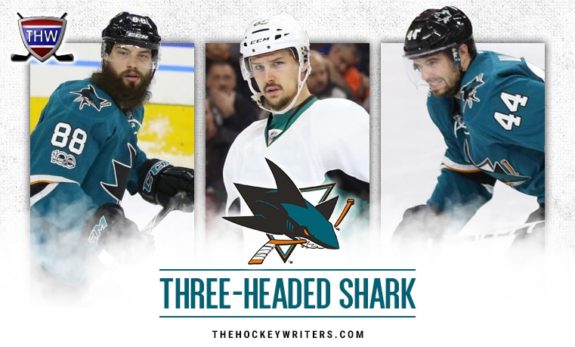
The nominal pairings are:
Burns (88) -Vlasic (44)
Dillon (4) -Karlsson (65)
Ryan (47) -Braun (61)
However, DeBoer frequently cuts his defenseman usage down to five (mostly by benching Ryan within the game) at which point the pairings became fluid. This happens about the midpoint of the game and from that point forward, there really are no set pairs, which is why I’ll cover the defensemen mostly as individuals, not pairs. Whether DeBoer’s tactic actually helps the team is subject to debate.
The Karlsson-Dillon pairing was exceptional together for the six weeks they were partnered beginning in early December, ending with Karlsson’s mid-January injury. The pairing has not looked as good in the playoffs, with Karlsson making several questionable plays and Dillon looking less comfortable than he has all season. I’m not sure the constant swapping of partners is doing either player much good.
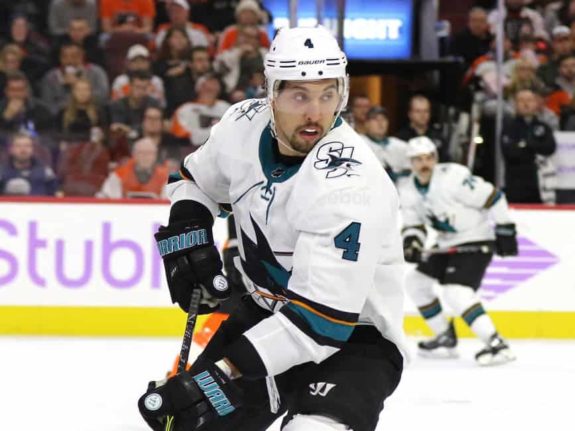
While Vlasic and Burns both had a strong series against Vegas, the Sharks were stunningly better with Vlasic in the line-up (he missed two full games and two periods in another game). In the time he played, the Sharks outscored Vegas 20-12, without Vlasic, the Sharks were outscored 13-3. Against Colorado and their elite top line, Vlasic proved a difference maker, especially in the final three games of the series. Burns will make mistakes, but he stepped up his defensive work, playing effectively across the ice.
Vlasic (3G, 22A, minus-6) is known as an elite defenseman, but it wasn’t the case most of the season, his first ‘minus’ season in over a decade. Vlasic is always key in a playoff series. He’ll get the shutdown assignment so expect to see him on the ice against the Blues top players. He’s succeeded in slowing down elite players in playoffs before, including Vladimir Tarasenko in the 2016 series, Connor McDavid in 2017 and Nathan MacKinnon this season (at least in the final three games). When the Sharks went to the Stanley Cup Final in 2016, Vlasic led the team in plus-minus. Despite the tough defensive assignments, he is tied for a team-best plus-5 in this season’s playoff run.
Braun (2G, 14A, minus-14) has had a tough season and his long-time pairing with Vlasic ended. He’s been beat regularly and in most every way imaginable. He peaked at plus-six on Nov. 1 and was minus-20 over the remainder of the regular season. Braun has been better in the playoffs, which is encouraging for the Sharks. He’s averaged over 21 minutes a game and is plus-two.
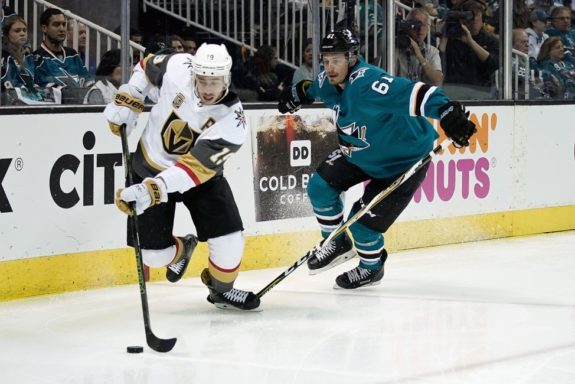
Burns (16G, 67A, plus-13) is a tour-de-force. He led the league in points by a defenseman and his plus-13 rating in the regular season is indicative of a player who did a lot of things right. He’ll still make plenty of mistakes, but his athleticism is second to none and the amount of ice he covers is enormous. His wrist shot from the point is the best in hockey, though overrated as a weapon. It is his ability to mix things up by shooting for tips and deflections which makes him a threat.
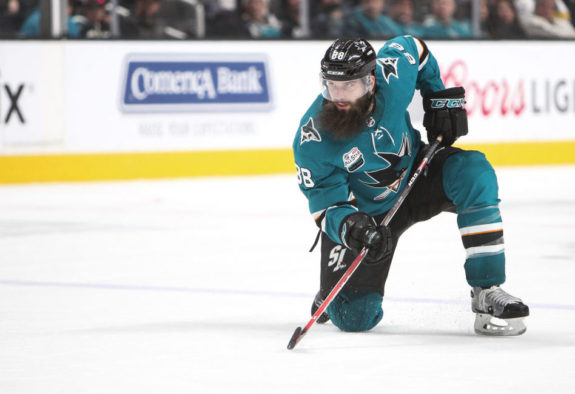
A big risk with his point shot is getting it blocked and turning into an odd-man rush the other way. Burns is incredibly dangerous when he goes from defenseman to power forward, something he can do in the blink of an eye. He’s largely restrained himself from doing this in the playoffs in favor of being more defensively responsible. He is good on the power play and surprisingly good on the penalty kill.
With a long reach and an even longer stick, the amount of area where he influences play is also enormous. Burns executes successful poke checks against players who have no reason to think any defender could make that play.
In the playoffs, Burns is averaging nearly 30 minutes of ice time per game, and if he looks fatigued at times, it might be because he is. If he takes over games at times, he’s just that good. Burns has 14 playoff points, tied for the NHL lead, including five goals and is plus-two. Burns is also dangerous to play against. Against the Avalanche, a big hit on Matt Calvert caused Calvert to miss most of the series while an open ice hip check on Mikko Rantanen left him hurting. For the record, both hits were clean.
Erik Karlsson, specifically his health, is an unknown. While Burns is a Norris finalist, a healthy Karlsson (3G, 42A, plus-6) might actually be the team’s best defenseman. For a quarter of the season, beginning in early December, he was probably the best player in the league. His numbers reflect the totality of his season, including a rocky start and injury issues since just before the All-Star break which caused him to miss almost the entire second half of the season. At his best, he changes everything.
Karlsson’s on-ice vision is remarkable and he can create offense seemingly out of nothing. He froze the entire Vegas defense before sending a perfect touch pass to Goodrow for the series-winning goal. Since his return for the playoffs, his defense is a liability and he’s frequently flat-footed or chasing play. How much his injury plays into this is unclear. How much he might improve from here is also unclear. He leads the playoffs with 12 assists (12 points is good for fifth in playoff scoring among those still playing), but is minus-five and has been on the ice for an enormous number of goals against the Sharks.
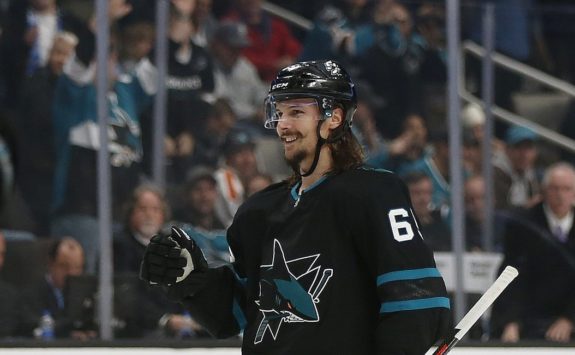
Another set of questions surround Karlsson and his potential to reach free agency. Karlsson hasn’t re-signed in San Jose, though he’s been eligible to do so since late February for an eight-year deal (and a seven-year deal before then). He can become a free agent in July. A big payday awaits, but could the contract situation impact his play? Or might it serve as a distraction? So far, there are no signs of this being an issue. That could change as more eyes focus on the two remaining series.
Dillon (1G, 21A, plus-19) is a big and physical player. He had an excellent regular season, really a breakthrough season. He was partnered with Karlsson when Karlsson took off. He’s paired well with others, too. Dillon’s skating has improved enormously over the past few seasons (the word pylon was used in years past, but no longer), his passing and positioning have improved as well. He led the Sharks in plus/minus in the regular season and while he’s clearly not their best defenseman, the result is not a fluke. That said, he’s been struggling in the playoffs and is a team-worst minus-six.
The oft-benched Ryan has played in all 14 playoff games and leads the Sharks in Corsi in the playoffs (even if it hasn’t always been pretty), but his ice time is always under ten minutes (average of eight) and it was a meager 3:35 in Game 7 against the Avalanche. Don’t ask me to explain it, Ryan has over 100 minutes of ice time in the playoffs and has been on the ice for exactly one goal against the Sharks.
Ryan (zero goals, seven assists, minus-one) is a smooth skater and good puck handler, but can be physically overwhelmed. In the regular season, he lost his starting job to Radim Simek, but regained it when Simek tore up his knee. He has complimented Burns well in the past and seems to fit respectably well with Braun now. Ryan’s uneasy relationship with the coach has hurt the player. Ryan plays like he needs to avoid any mistakes, which is not how a player succeeds.
Heed, a former forward, is small and agile, with a big shot. Heed’s defensive work isn’t great, but his chemistry with Vlasic is real. Heed (2G, 11A, plus-9) made his NHL playoff debut when Vlasic was injured and played in two Sharks losses. He likely only plays if there is an injury, but he is very capable.
The Sharks’ Forwards
The Sharks are a power-forward-driven team, with Hertl, Evander Kane and Timo Meier all getting to 30 goals this season. The Sharks have plenty of skill in the top nine forwards, and as long as they remain healthy, a pretty good fourth line. Fourth line players scored the series-winning goals in both series.
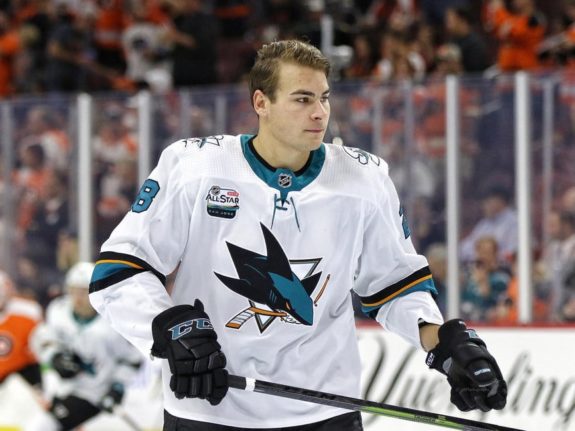
The Sharks’ top power forwards are tough to handle for any team. They are most effective using their power players when they emphasize play behind the net. If the Sharks are relentless in going behind the net, they can win. If they chose not to go back there, they’ll be helping the Blues.
The Top Line: Meier (28) -Couture (39) -Nyquist (14)
The Sharks’ top line includes Timo Meier, Logan Couture and Gustav Nyquist.
Couture (27G, 43A, minus-6) is one of the team’s critical leaders. He struggled in the season’s closing month and had a brutal physical series against Vegas. He also totaled six goals in the seven games, including two on the power play in Game 7 which turned the series. His nine goals and 14 points in the playoffs are tied with a teammate for tops in the playoffs. This isn’t new for Couture, he led the entire playoffs in scoring in 2016 and has the second most playoff goals since he joined the league in 2010 – behind Alex Ovechkin, ahead of Sidney Crosby.
The powerfully built Meier (30G, 36A, plus-9) began the playoffs nursing a wrist injury and it isn’t clear if he’s quite right. But he’s mostly right. In Game 6 against the Avalanche, he skated against into the offensive zone surrounded by four defenders. While they managed to contain him, there wasn’t much left to defend the rest of the Sharks and a goal ensued. He is just 22, whether he is ready to take the next step as a playoff performer is the question. At times, the answer looks like a yes. At other times, not so much. He has the talent and tenacity. He’s also strong as a bull. On this line, he is the guy San Jose needs to go behind the net. Meier has 10 points in the playoffs and is plus-five. If he scores, you may hear the refrain “Timo time.”
Nyquist (six goals, five assists, plus-1 in 19 games as a Shark) came from the Detroit Red Wings at the trade deadline and the results have been mixed. He is quick with a goal-scoring touch (22 for the season), but doesn’t win a lot of battles and still seems to get lost on the ice too often. Still, on the Sharks top line, Nyquist has found ways to contribute and is plus-five, tied for tops on the team. He’s made some crafty passes in the playoffs.
The Other Top Line: Hertl (48) -Pavelski (8) -Kane (9)
On the next line, the Sharks have had success pairing Tomas Hertl with Evander Kane. The duo was excellent in the regular season, but only one has carried their success into the playoffs.
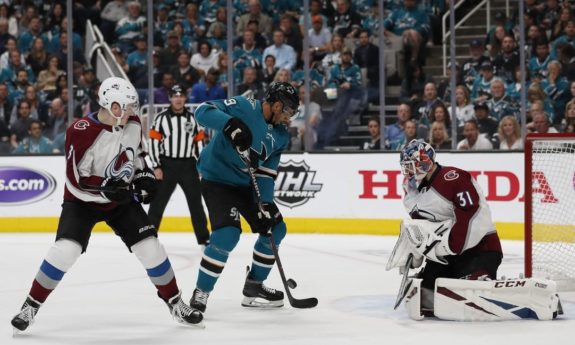
Hertl (35G, 39A, plus-5) is a handful and is the Sharks best forward. Don’t be surprised if Hertl proves the guy the Blues have the most trouble stopping. They won’t be the first team. He is a power forward who can skate, dangle and push defenders out of the way. And oh yes, he can shoot, too.
Hertl had six goal, eight points and an overtime shorthanded winner against the Golden Knights in the opening round. He scored both Sharks goals in a 2-1 win in Game 5 against the Avs and had a goal in their 3-2 win in Game 7. In the playoffs, Hertl has nine goals and 14 points, tying him with Couture for the NHL playoff lead.
Joe Pavelski (38G, 26A, minus-4) in the new kid on this line. He had a miserable opening round series, loosing teeth in the opener and leaving the series concussed and bleeding in Game 7. In between, he played well below his usual standard. He missed the first six games against the Avalanche before returning, heroically, in Game 7. Heroically, as in scoring one goal, assisting on another and garnering first star honors.
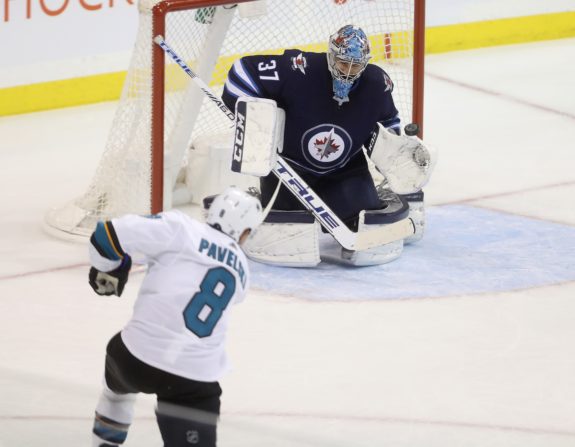
The Sharks have missed Pavelski in both rounds, first playing below his ability due to the injury suffered in the playoff opener, then not playing at all until the finale of Round 2. That he had a strong game against the Avalanche in the series finale is very good news for the Sharks.
Pavelski is elite at redirecting pucks for goals. While he isn’t big, he is a frequent visitor at the net front. He can also shoot from the wing or in the slot. He’s got a well-deserved reputation for coming up big in key moments. Pavelski isn’t fast, but he sees the game fast and thus can make tough plays look easy. Though he’s known more for scoring, he is an excellent passer.
Kane (30G, 26A, minus-4) is the team’s most dynamic player with great speed. He also spends too much time in the penalty box. Both Colorado and Vegas largely neutralized him. He has seven points in the playoffs, but is minus-four.
The Third Line: Thornton (19) – Sorensen (20) -Labanc (62)
Joe Thornton centers Kevin Labanc and Marcus Sorensen on the Sharks third line. The trio played a superb game in the opener of the series against the Avalanche, but they’ve been shrinking and not overly effective since.
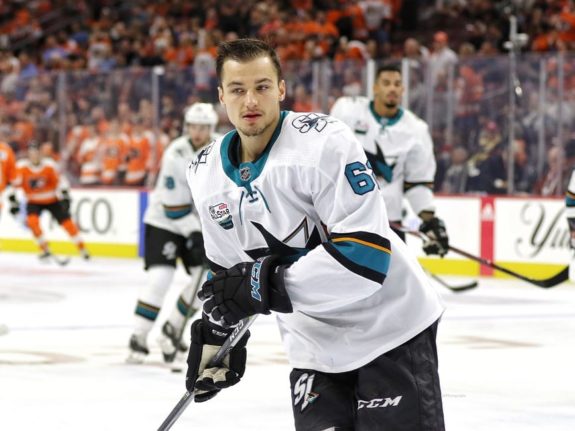
Labanc put up career numbers (17G, 39A, minus-1). Though his defensive game has improved from last season, it is still lacking. At least it is no longer a shock when he wins a puck battle. Labanc became a bit of a celebrity by garnering four points on the Sharks frenzied five-minute power play in Game 7 against Vegas, setting at least one NHL record in the process. At five-on-five, though, he is less dangerous, adding just two points at even strength over the 14 playoff games.
Sorensen (17G, 13A, plus-10) is small, very quick and surprisingly physical. Though he had respectable numbers this season, it felt like he probably deserved better. He can be a thorn in the side of opposing teams. At one point, he drew a roughing penalty in the series against the Avalanche.
Thornton (16G, 35A, plus-8) had a difficult start to the season, likely related to recovering from knee surgery. But in the last couple months, he’s turned back the clock a good bit. The future Hall-of-Famer isn’t the top line center of years past, but in a third line role, he can be a nightmare for other teams. Still, he is inconsistent and not very fast, a combination Colorado took advantage of at times. In the playoffs, Thornton has six points, five at even strength, but is minus-four.
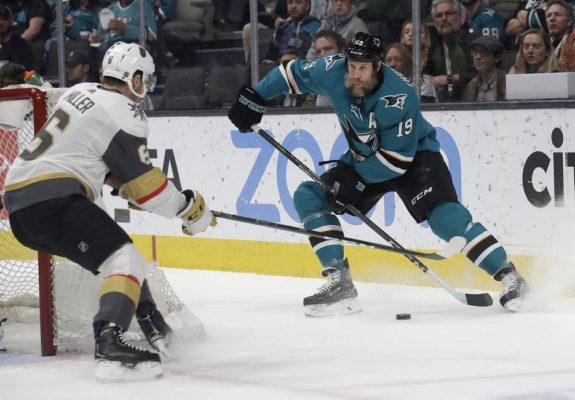
The Fourth Line: Goodrow (23) -Donskoi (27) -M. Karlsson (68)
The rest of the Sharks forwards will comprise the fourth line and bench. Barclay Goodrow, he of the overtime winner in Game 7 against Vegas, centers the line with wingers Melker Karlsson and Joonas Donskoi.
Lukas Radil (jersey 52), puncher Micheal Haley (18) or youngster Dylan Gambrell (7) are candidates to fill in case of injury.
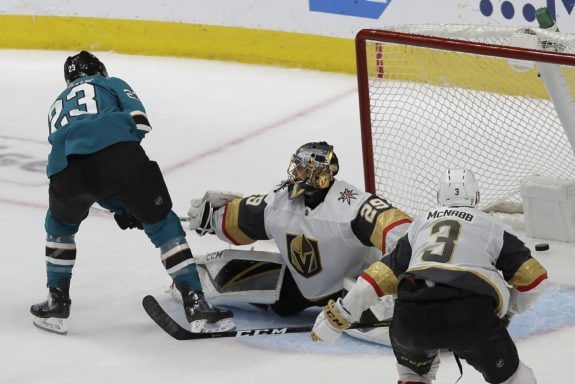
Karlsson (12G, 4A, minus-1) has had a mixed playoffs, getting some good chances but failing to score beyond his two assists. Like Goodrow (7G, 9A, plus-4), Karlsson is an effective penalty killer. Joonas Donskoi (14G, 23A, plus-10) has been effective with the group and he scored the series winning goal against the Avalanche, on a play which bore great similarity to his overtime game winner in the Stanley Cup Final. He is capable of scoring big goals. Still, he is a better set-up man than goal scorer, unfortunately playing on a line with limited scoring ability. He was steamrolled by the Golden Knights’ Brayden McNabb in Game 6 on a hard, clean hit and was out until Game 5 of the Avalanche series. Donskoi hadn’t scored a goal since the team’s Jan. 10 until his series winner against the Avalanche.
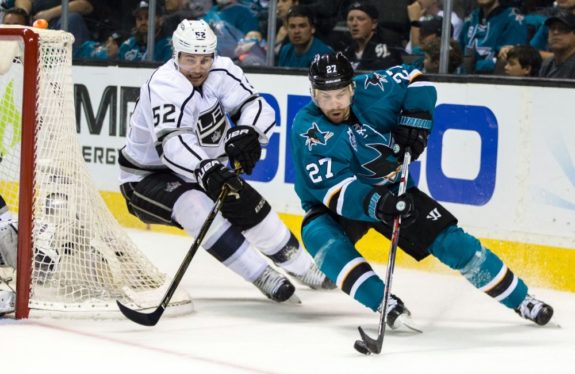
If someone gets dinged, Radil (7G, 4a, plus-7) is an effective player as well, though DeBoer doesn’t trust him in the playoffs. DeBoer prefers to use the tough but ineffective Haley. When he does, it is a win for the opponent.
The San Jose Power Play
The Sharks’ power play is less of a weapon than it might be. The team doesn’t draw enough penalties and their conversion rate has been below the level their firepower indicates. Erik Karlsson, Pavelski, Burns, Thornton, Couture, Hertl, Kane, Meier, and Nyquist is just a ridiculous amount of firepower. Add in Labanc, who thrives in open ice, and San Jose can roll two units, both incredibly dangerous.
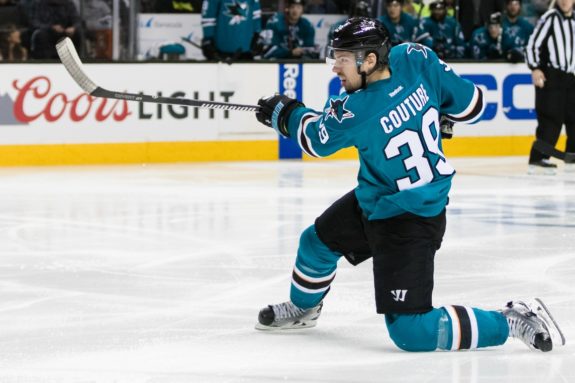
During the regular season, the power play underachieved. And it underachieved in a big way for the first six games and 50 minutes in the series against Vegas, scoring just four times and giving up two short-handed tallies. The power play came to life on the five-minute major to Vegas with just ten minutes left in regulation in Game 7. And my goodness, did it ever roar, scoring four times to turn a 3-0 deficit into a 4-3 lead.
Against the Avalanche, it went back to quiet mode. In seven games, it managed just two scores and allowed one. Yikes!
Winning more faceoffs to start the power play will be very helpful. Better offensive zone entries will also make a difference. These were issues in the regular season, and in both playoff series. The Sharks power play can be exceptional, but it has been mediocre all too often. If the power play finds its way, it spells trouble for the Blues. But it hasn’t been good (with one stunning exception) this postseason.
Sharks’ Penalty Kill
The Sharks’ penalty kill was terrific for a good chunk of the season, then faded badly in the latter parts.
Against Vegas, the penalty kill was abysmal. The Sharks do not take a lot of penalties, but in the highly physical series against Vegas, they took more than normal and Vegas nearly won the series because of their power play.
The Sharks flipped the script against the Avalanche, killing 21 of 23 penalties in the series. In critical moments, the penalty kill aided the Sharks.
For the Sharks, maintaining this ‘return to form’ will be critical. The Sharks use many of their top players on the penalty kill, including Burns, Hertl and Couture.
An Inspired Team
There is are inspirational aspects to this playoff run for the Sharks. Thornton, at 39, is running out of playing years and while he sits with legends on a variety of NHL all-time lists, he lacks a Stanley Cup. No doubt, his teammates are anxious to change this. The more it feels like this might be the year, the more intense this factor becomes.
The injury Joe Pavelski suffered against the Golden Knights has proven another source of inspiration. The ‘Pavs Payback’ is the local slogan, but there is more to it. It boils down to this. The Sharks took a beating against Vegas and there’s a sense this team needs to do something special to make it all worthwhile.
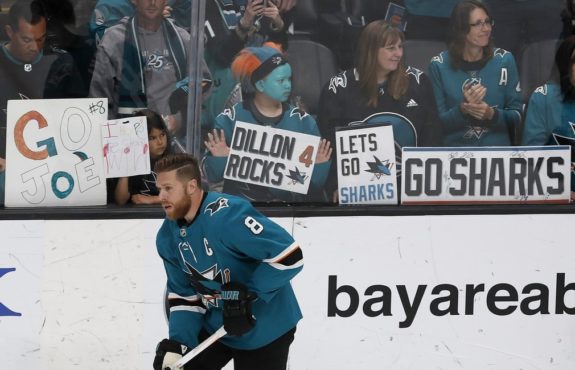
This Sharks team was written off by many. Down 3-1 in a series with a goalie who couldn’t make it through the opening period was one reason the team was given up for done. Down three goals near the midpoint of period three in Game 7 is another. The few hundred fans who departed the venue early that Tuesday evening probably figured it was over. Turned out, it wasn’t. The Sharks believe in themselves more than most teams; they’ve given themselves reason to believe.
The Sharks have a lot of veteran savvy, but they also have plenty of inspiration.
How the Sharks Win
For the Sharks, it usually comes down to defense and goaltending. Neither has been consistent this season. The stat bears repeating, the Sharks finished 32-0-0 when allowing two or fewer goals in the regular season. They’re now 7-0 in the playoffs. They have enough offense to win games if they play a disciplined game.
If the Sharks falter, I expect it will be mental errors from a physically beat-up and fatigued team. There might also be some emotional/intensity challenges, given the nature of the last two series. DeBoer plays his top players huge minutes, this is an area of vulnerability. Against Colorado, the Sharks allowed just five scores in the first half of games. Past the midpoint of games, the Sharks gave up 13 goals. DeBoer denies fatigue is an issue (it appears to be a blind spot of his), but the numbers aren’t lying.
Expect plenty of line and defensive pair juggling from DeBoer, with players like Donskoi and Ryan on particularly short leashes.
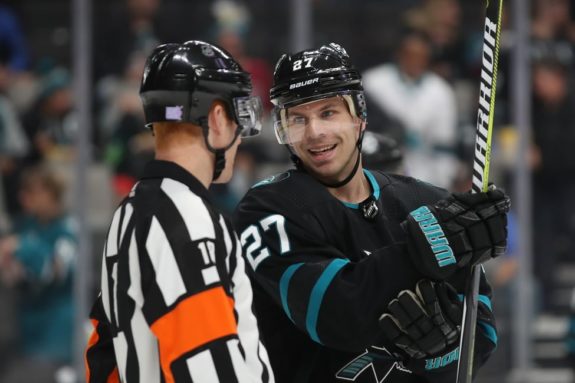
The good news, the Sharks know how to play better than they did late in the season. They know the formula for success and it was reinforced in their series wins.
The Sharks are at their best when they stay focused. They are getting their best goaltending of the season and the penalty kill has returned to form. Still, key elements like the power play and Erik Karlsson are not pulling their weight. We’ll see what Sharks team shows up – starting on Saturday.